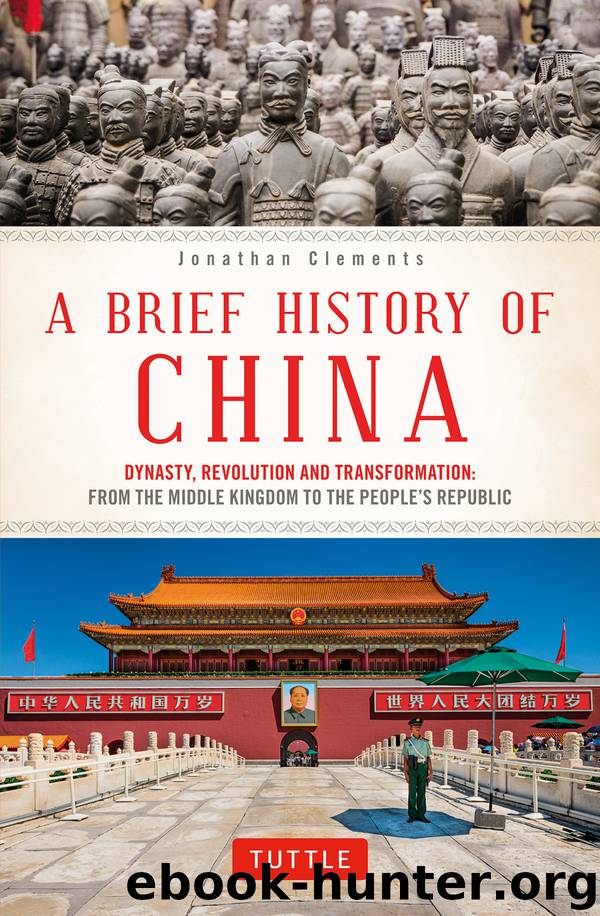A Brief History of China by Jonathan Clements

Author:Jonathan Clements
Language: eng
Format: epub
Publisher: Tuttle Publishing
However, Yue Fei was remaining loyal to a Northern Song ideal of a unified China fighting the barbarians, calling them “Xiongnu” in an evocation of enmities past. The Southern Song had spent the previous decade reconciling itself to a situation in which north China was abandoned to its new masters. With Yue Fei poised ready to retake Kaifeng, his superiors in Hangzhou were confronted with the possibility that the two hostage emperors, held captive since 1127, might be within reach. Yue Fei was ordered to halt his advance and report back to the court—a command which came as a shock and surprise to both him and his gung-ho troops.
Back in Hangzhou, Yue Fei was held for two months’ intense interrogation, by officials determined to pin some kind of crime on him. With increasing public demands for an explanation, his court enemies continued to press on the grounds that there “must be something”—mo xu you, their precise wording, has been a Chinese byword for trumped-up charges ever since. Executed for no good reason, Yue Fei would be posthumously pardoned by Gaozong’s successor in 1162 and canonized as a national hero in 1179. His official biography, which made it into the chronicles of the Song dynasty, was written by his grandson in the 1180s, by which time tales about him were already growing steadily taller. Statues were commissioned for his tomb of the four conspirators who caused his death, kneeling in contrition. For centuries to come, these effigies would be cursed, spat on and urinated upon by numerous patriots—chronic vandalism repeated to such an extent that they have had to be replaced at least twice, and the versions that stand today are fenced-in replicas.
By the time of Yue Fei’s shameful death, the stalemate between the Jurchens and the Chinese had left little difference between them. Both now implied they were the true inheritors of the Mandate of Heaven, mounting increasingly lavish religious ceremonies in attempts to prove their piety and suitability. Both ruled populations in conditions of relative prosperity, who yearned to be reunited with their fellows across the border. Both were about to have their dreams quashed by a new an unexpected enemy: the Mongols, who would bring unity at a dreadful cost.
The Mongols began and just another tribe in the steppes and forests of the north. Tang dynasty chronicles of the 700s record the Mung-nguet of the north, using the Meng character that is still used to classify them in modern Chinese. They seem to have wandered westwards over the next few centuries, out as far as Lake Baikal.
The meaning of the word Mongol, however, changes radically in the lifetime of their great leader Temujin (1162–1227), whose rise to power united multiple clans of the steppes, turning them from a rabble of horse-men on the edges of the Jurchen realm into an unstoppable, roaming nation. The Mongol word for both a court and a camp, deriving its name from the impression left in the grass by a tent, is ordu. From it, multiple European languages would derive the term “horde.
Download
This site does not store any files on its server. We only index and link to content provided by other sites. Please contact the content providers to delete copyright contents if any and email us, we'll remove relevant links or contents immediately.
| African-American Studies | Asian American Studies |
| Disabled | Ethnic Studies |
| Hispanic American Studies | LGBT |
| Minority Studies | Native American Studies |
Cecilia; Or, Memoirs of an Heiress — Volume 1 by Fanny Burney(32540)
Cecilia; Or, Memoirs of an Heiress — Volume 2 by Fanny Burney(31939)
Cecilia; Or, Memoirs of an Heiress — Volume 3 by Fanny Burney(31928)
The Great Music City by Andrea Baker(31915)
We're Going to Need More Wine by Gabrielle Union(19032)
All the Missing Girls by Megan Miranda(15931)
Pimp by Iceberg Slim(14479)
Bombshells: Glamour Girls of a Lifetime by Sullivan Steve(14046)
For the Love of Europe by Rick Steves(13883)
Talking to Strangers by Malcolm Gladwell(13342)
Norse Mythology by Gaiman Neil(13340)
Fifty Shades Freed by E L James(13229)
Mindhunter: Inside the FBI's Elite Serial Crime Unit by John E. Douglas & Mark Olshaker(9313)
Crazy Rich Asians by Kevin Kwan(9273)
The Lost Art of Listening by Michael P. Nichols(7487)
Enlightenment Now: The Case for Reason, Science, Humanism, and Progress by Steven Pinker(7305)
The Four Agreements by Don Miguel Ruiz(6744)
Bad Blood by John Carreyrou(6610)
Weapons of Math Destruction by Cathy O'Neil(6261)
